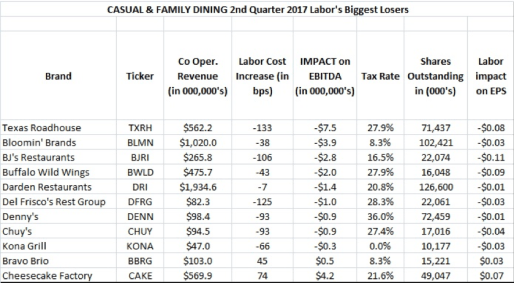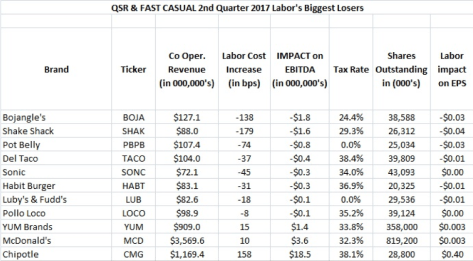This blog post is a continuing effort to focus managers, investors and operators on the impact that rising labor costs is having on their profitability.
Well, the early results are in. In the 2Q17 as of this afternoon’s (August 5, 2017) reporting 22 companies have reported earnings that included a separate line item for labor costs.
The table below shows the impact on EBITDA, sorted from worst to best for each of the 22 companies. First, 9 of the 11 companies in the Casual and Family Dining segment that reported earnings experienced an average negative impact of 78 basis points. Texas Roadhouse (TXRH) led the way with a $7.5M negative impact on EBITDA (133 bps or $0.08 EPS). This is the second consecutive reporting period that TXRH has experienced a negative impact from labor of this magnitude. This continuingly negative impact from labor costs is despite positive same-store sales (SSS) of over 3% in each of the last 2 quarters. This implies that the negative impact of labor on profitability should accelerate should SSS turn negative.
BJ’s Restaurant (BJRI) and Del Frisco’s (DFRG) also joined the ranks of the largest negative impacts from labor. Both had moderately negative impacts from labor in the 1Q17, but have since experienced deteriorating labor costs.
All 11 companies in the casual and family dining segment reported an average negative 53 basis point impact. The positive labor cost leverage from Bravo Brio & Cheesecake Factory (CAKE) occurred as managers tightened cost controls in the face of ongoing negative SSS (BBRG) or nominally positive SSS (CAKE).

On the Quick Service & Fast Casual side of the industry, the impact of higher labor costs was more muted. Several companies, Bojangel’s (BOJA) and Shake Shack (SHAK) reported large negative impacts of labor, well over 100 bps; (138) and (179), respectively. Both companies experienced moderate declines in SSS of just less than 2%. This result implies that either their operating systems are more highly leveraged than expected, or management kept labor in place and worked hard on sales improvements.
The average impact of those companies reporting negative labor comparisons was 66 bps. Several companies reported mid-double digit declines. Overall, the segment reported a decline of 32 bps, as labor had a positive impact on several companies. These companies were McDonald’s (MCD), YUM Brands (YUM) and Chipotle (CMG). This is the second consecutive quarter that CMG had a significant positive impact on EBITDA ($42.8M in 1Q17 and $18.5M in 2Q17) from labor as same-store sales of +8%, continued their positive momentum in the 2Q17.

The preceding information is the work of NRCP. It cannot be copied, or reproduced without the express written consent of NRCP.
National Retail Concept Partners, LLC is a full-service consultancy based in Denver, CO. working with a variety of industries, including the automotive, retail, restaurant and hospitality industries. Their website is www.nrcpartners.com.
Partners Larry DeVries and Dean Haskell wrote the preceding post. These recurring posts can be accessed at their LinkedIn profiles. NRCP recently shared its labor optimization success at the Restaurant Finance Conference. The partners can be reached by email at ldevries@nrcpartners.comanddhaskell@nrcpartners.com. Mr. DeVries is based in Denver, Colorado and Mr. Haskell is based in Nashville, Tennessee.
